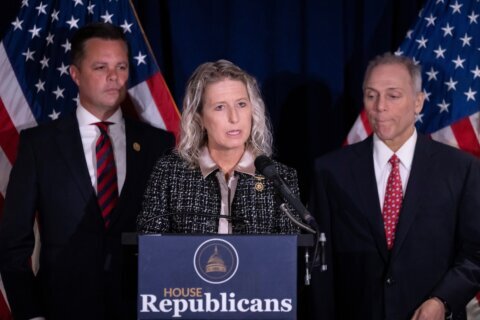U.S. Sen. Joe Manchin (D-WV) said Friday that he opposes a bill recently passed by the House that would make D.C. the nation’s 51st state.
During a call with reporters, Manchin said he believes making D.C. a state would require a constitutional amendment.
In his comments, Manchin cited the 23rd Amendment, which gave the District three electoral votes. D.C. does not have a vote that counts in Congress.
“It gave D.C. residents the right to vote in presidential elections, but it complicates D.C.’s pathway to statehood, because Congress had three options to choose from back in 1961,” he told reporters. “They could either have D.C. statehood, they could have retrocession to Maryland … or they could have granted electoral votes to D.C.”
He noted that at the time, Congress selected the option involving electoral votes. His comments were reported by WVNews.
Earlier this month, the House approved a bill strictly along party lines to make D.C. a state with one representative and two senators, while a tiny sliver of land including the White House, the U.S. Capitol and the National Mall would remain a federal district.
Republicans argued during the House vote that the measure wouldn’t withstand judicial scrutiny. Manchin said he would “tell his friends” that if they pursued statehood through legislation, “you know it’s going to go to the Supreme Court.”
“Every legal scholar has told us that, so why not do it the right way and let the people vote and see if they want a change,” Manchin said.
Even before the comments, statehood supporters already faced many challenges getting the bill to the floor for a vote in the U.S. Senate. Unless Manchin changes his mind, his position makes it even more unlikely the bill will get a vote, much less be approved.
No Republicans in the House or Senate have said they would support the legislation, which is sponsored by D.C. Del. Eleanor Holmes Norton.
Soon after Manchin’s comments, Norton released her own statement, challenging his view that making D.C. a state would require a constitutional amendment.
An amendment to the Constitution would require the approval of two-thirds of the states.
“First, no new state was admitted by constitutional amendment,” Norton said in her statement. “All 37 new states were admitted by Congress, and there has never been a successful constitutional challenge to the admission of a state.”
Norton argues that the Constitution leaves the decision to Congress.
Republicans have rejected that assertion. The GOP is also concerned that making D.C. a state would likely add two Democrats to the Senate, as well as a voting member in the House, since the District votes overwhelmingly for Democrats.
The House last week approved Norton’s statehood bill on a party-line vote, 216-208.
Even if Senate Democrats were to get all of their members to support the measure, they would still face a major political hurdle in getting a floor vote: The 60-vote filibuster.
Without any Republicans willing to allow a vote, Democrats would need to alter rules related to the filibuster. Manchin has also stated unequivocally that he will not vote to eliminate or weaken the filibuster.
The Associated Press contributed to this story.








